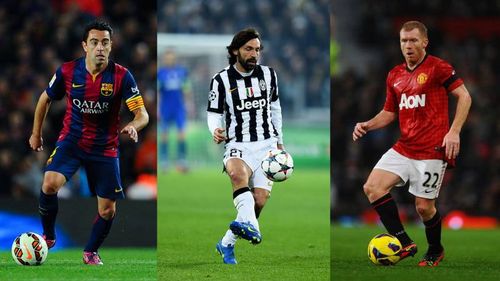
Xavi, Pirlo and Scholes: Strangers by birth, brothers by nature

Oh, the tears!!
About a fortnight ago, it was Xavier Hernandez. A moving montage shown as a tribute to ‘El profe’ in his final home appearance was enough to break the emotional dams of those chameleon eyes, not to mention his legions of fans in the stadium and across the globe, giving rise to new saline rivers. The whole occasion, however, had positive undertones.
Xavi was leaving in the twilight of his career after giving his best years to his boyhood club. During this time, he had become the heart and soul of the tiki-taka team that blended philosophy with success to create awe-inspiring spectacles of football and, of course, ridiculous trophy-hauls (sextuple, anyone?). Moreover, he had won the La Liga in his last season and had a chance to complete a historic double-treble.
Where Xavi won, Andrea Pirlo lost. The timeless Italian playmaker had possibly seen this as an opportunity to win the Champions League one last time. As Barcelona ran away 3-1 winners on Saturday night, a tearful Pirlo was a poignant sight to behold. When it comes to moments stirring the human psyche, sorrow invariably trumps joy.
A warm post-match embrace between the two signified the end of an era, an era which also includes Paul Scholes. An equally diminutive and equally revered playmaker, Scholesy, like L’ Architetto and El profe, made his domestic league dance to his tune in the 2000s.
Considering their similar physical build, skill-set and personality (more on this later), it is remarkable how differently their careers started and progressed, how different their playing positions were in their respective teams and how different the perception of them was in their own country.
Their comparison in this light offers an interesting study on the influence of different environments (read footballing cultures) on individuals with similar talents.
Early career
Xavi
Xavi made his first-team debut for FC Barcelona at the age of 18 in 1998 under the mercurial Louis van Gaal. The Dutch manager placed immense faith in him, rating him higher than Zinedine Zidane, but the Cules were far from impressed.
To begin with, he was being played as a deep-lying playmaker, a position for which he had to compete with Pep Guardiola. Pep was more suited to this position as he was slower with a bias to the long pass. He was also a Barca legend by then and Xavi would occasionally get booed by fans on substituting him.
"I didn’t get recognition until 2008, when I’d been in the team for ten years. If I leaf through papers from years gone by, it makes me laugh: they said I was obsolete, that Edgar Davids made me look good, that I only moved the ball from side to side, they called me ‘the windscreen wiper.”
Guardiola’s exit in 2001 helped matters but till 2003, Xavi was played by managers in the former’s position. It would eventually take Frank Rijkaard’s appointment and, after that, Guardiola’s return as manager to set matters right.
Pirlo
Pirlo too had his fair share of early struggles. After signing for Inter from Brescia in 1998, the Italian youngster could not make much of an impact for Nerazzurri, making just 22 appearances and was loaned out twice between 1999 and 2001.
During his second loan spell at Brescia, however, manager Carlo Mazonne changed his position from Trequartista or attacking midfielder to Regista or deep-lying playmaker. Consequently, Pirlo was then playing behind Roberto Baggio, creating chances for the latter and dictating the pace of the game.
The move brought out the best in Pirlo. It was also testament to the tactical nous of Serie A, where managers are constantly on the lookout- more than in any other league- for new ideas to benefit the players and the team as a whole.
By the summer of 2001, Pirlo had signed for AC Milan. His replacement at Brescia? Pep Guardiola.
Scholes
The initial doubts over Scholes were entirely unrelated to his skills with a football- they usually revolved around his build. ‘Too small’ was the stock phrase for him at Manchester United, according to the then manager Sir Alex Ferguson.
The doubts were understandable, given the physical nature of the English Premier League. When Scholes progressed to play for the youth A team, he was a centre-forward and Sir Alex was convinced he had neither the pace nor the strength to play in that position.
The misgivings would ultimately prove to be unfounded, as Scholes used the running game of the Premier League to his advantage. As a centre forward, he would play in the hole behind the striker, provide link-up play and arrive in the box at the right time to sometimes even head goals in.
In doing so, he shattered the myth in many a British mind, no less in that of Sir Alex, that English football is only meant for the big and burly.